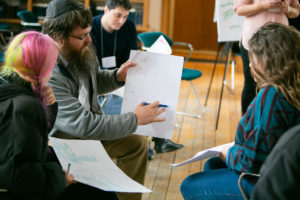Israel
Millennials seek meaning – that’s why we need new communities
A Hassidic tale tells of a rabbi who used to dip in the river every morning. One day, the new local policeman sees him diving into the frozen river. He runs to the strange old man, shouting, “Who are you? Where do you come from? Where are you going to?” The old rabbi smiles gently and asks the policeman, “How much do they pay you?” “Ten kufeykas a day,” answers the baffled young man. “I’ll tell you what,” says the rabbi, “I’ll pay you 20 if you come every morning and ask me who I am, where I come from, and where I’m going.”
Human beings are dynamic and ever-evolving creatures, and just like our muscle system becomes atrophied if not stimulated enough, so too do our moral and intellectual systems. Hence, it’s crucial that we’re asked those questions constantly. We could create a mobile app to do that, but I argue that communities are the optimal environment for challenging our character and preserving our identity.

This sentence may ring a bell as a common catch phrase among so-called millennials, meaning those born after 1982. Many see us as a challenge to be addressed, especially in the Jewish context, worried about diminishing affiliation. It may even serve as an explanation – “See? All millennials care about is themselves.”
As one of the oldest millennials alive (born in December 1982), I would like to offer a different approach. Millennials are no different. Human physiology and psyche don’t change over a short period of time (eons). What does change is the environment. Like everybody who preceded us, we have the need of food and shelter, and the millennial challenge begins where this problem ends. Indeed, making a living can still be tough, but relatively, Jewish millennials are expected to possess more resources than previous generations.
After satisfying their basic needs, people crave a sense of belonging, identity, and meaning. The aspiration to become a better version of one’s self is rooted in this, and not in egocentrism. In fact, data shows that almost half of millennials would move to lower paying jobs if they offered more meaning and purpose.
However, the unprecedented economic-technological leapfrog has its side-effects. We all know of the environmental crisis, but there’s another one: loneliness. According to a 2018 Harvard study, loneliness is an epidemic, riskier to health than physical inactivity and almost as risky as smoking.
The government in the United Kingdom even established a new ministry in 2018 to deal with loneliness. And no, social media doesn’t solve it. Research shows it increases it. Just like we still don’t have a better solution for hunger than food, we don’t have a better solution for loneliness than communities. What we do have is new technologies to produce these.
So, why is millennial affiliation with established Jewish communities on the decline? First, millennials are looking for intimate and horizontal structures rather than mega-communities. In addition, Jewish millennials see themselves as privileged, hence responsible for everybody, and don’t find themselves in communities originally designed to protect a weak minority.
On top of all that, sociology plays a role. The Jewish ecosystem was geared to support Jewish identity until college, assuming youngsters will get married soon afterwards and circle back to the community, which is designed to accommodate young families. However, circumstances have changed. The gap between college and settling down is no longer two to three years, not even 10, sometimes not even 15.
One idea that has been tested successfully in Israel and other countries is intentional communities. An intentional community is a small, non-hierarchal group of people who have consciously decided to live together spatially and temporally around a shared purpose. In this sense, an intentional community can serve as a framework for individual growth and moral behaviour as well as give people the opportunity to work collaboratively to make the world a better place.
However, one community isn’t enough, and one could justly argue that a group of 50 to 60 households cannot possibly be the cure for the contemporary Jewish peoplehood predicament. He or she would be right. We need scale, but we also don’t want to give up the benefits of an intimate community. The solution would be a network of communities. Since 2013, at Hakhel, we have been working to build such a global network together with Israel’s diaspora affairs ministry, which joined us in 2017. Today, Hakhel’s network comprises more than 140 communities in 30 different countries and all continents (well, except Antarctica).
One country, however, wasn’t on our radar. Until 2019, our assumption was that the South African Jewish community was close-knit and well connected to Israel anyway, hence we should concentrate our efforts elsewhere. When an initial connection was formed through a friend of a friend, we were amazed to discover that here, like anywhere else, the circumstances have changed.
Below the surface, a Jewish renaissance is taking place here as well, and today, we already work with three communities in Johannesburg and are looking to expand to Cape Town.
If you want to attract millennials, you need to offer them – no, sorry, create with them – the appropriate complex response. All of these communities all have different themes, but they share a goal in that they’re creating the Judaism of the future, one in which millennials become a better version of themselves.
- Rabbi Lavi is co-founder of the Israeli umbrella organisation of intentional communities, and of Hazon’s Hakhel Jewish Intentional Communities Incubator. His recent book, “Seven”, deals with the social and economic aspects of the shmita year. arilavi@gmail.com